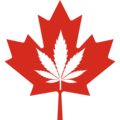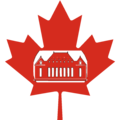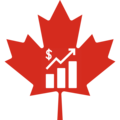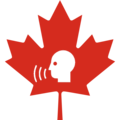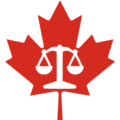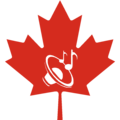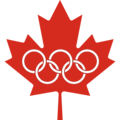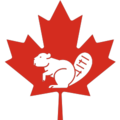Portal:Canada
| Showcase | Contents | Contributing |
Introduction
Canada is a country in North America. Its ten provinces and three territories extend from the Atlantic Ocean to the Pacific Ocean and northward into the Arctic Ocean, making it the world's second-largest country by total area, with the world's longest coastline. Its border with the United States is the world's longest international land border. The country is characterized by a wide range of both meteorologic and geological regions. With a population of just over 41 million people, it has widely varying population densities, with the majority residing in urban areas and large areas of the country being sparsely populated. Canada's capital is Ottawa and its three largest metropolitan areas are Toronto, Montreal, and Vancouver.
A developed country, Canada has a high nominal per capita income globally and its advanced economy ranks among the largest in the world by nominal GDP, relying chiefly upon its abundant natural resources and well-developed international trade networks. Recognized as a middle power, Canada's support for multilateralism and internationalism has been closely related to its foreign relations policies of peacekeeping and aid for developing countries. Canada promotes its domestically shared values through participation in multiple international organizations and forums. (Full article...)
Featured article -
The Battle of Quebec (French: Bataille de Québec) was fought on December 31, 1775, between American Continental Army forces and the British defenders of Quebec City early in the American Revolutionary War. The battle was the first major defeat of the war for the Americans, and it came with heavy losses. General Richard Montgomery was killed, Benedict Arnold was wounded, and Daniel Morgan and more than 400 men were taken prisoner. The city's garrison, a motley assortment of regular troops and militia led by Quebec's provincial governor, General Guy Carleton, suffered a small number of casualties. (Full article...)
Current events
- April 28, 2025 – 2025 Canadian federal election
- Voters in Canada go to the polls to elect the 343 members of the House of Commons to the 45th Canadian Parliament. (BBC)
- The Liberal Party under leader Mark Carney is projected to form government for the party's fourth consecutive mandate, with Carney remaining prime minister. (The Globe and Mail)
- Conservative Party leader Pierre Poilievre and New Democratic Party leader Jagmeet Singh lose their seats, with the NDP also losing official party status in the House. Each make speeches conceding the election, with Singh announcing his intention to resign as party leader. (CTV News)
- April 27, 2025 – 2025 Vancouver car attack
- The death toll from yesterday's vehicle-ramming attack at a street festival in Vancouver, British Columbia, Canada, rises to eleven with at least 20 others injured, making the attack tied for the deadliest vehicle-ramming attack in Canadian history. The British Columbia Prosecution Service charges the perpetrator with eight counts of second-degree murder, while investigators also rule out terrorism. (CTV News) (AP)
- April 26, 2025 – 2025 Vancouver car attack
- Nine people are killed and several others injured, after a car is driven through a crowd at a Philippine-Canadian festival in Vancouver, British Columbia, Canada. (Al Jazeera)
- April 25, 2025 –
- A Royal Thai Police Viking DHC-6 Twin Otter aircraft crashes while conducting a test flight for parachuting training near Hua Hin Airport in Prachuap Khiri Khan, Thailand, killing all six people on board. (The Nation) (AP)
Selected panorama -
National symbol -
Canadarm or Canadarm1 (officially Shuttle Remote Manipulator System or SRMS, also SSRMS) is a series of robotic arms that were used on the Space Shuttle orbiters to deploy, manoeuvre, and capture payloads. After the Space Shuttle Columbia disaster, the Canadarm was always paired with the Orbiter Boom Sensor System (OBSS), which was used to inspect the exterior of the shuttle for damage to the thermal protection system. (Full article...)
Selected vital article -
Canadian cuisine consists of the cooking traditions and practices of Canada, with regional variances around the country. First Nations and Inuit have practiced their culinary traditions in what is now Canada for at least 15,000 years. The advent of European explorers and settlers, first on the east coast and then throughout the wider territories of New France, British North America and Canada, saw the melding of foreign recipes, cooking techniques, and ingredients with indigenous flora and fauna. Modern Canadian cuisine has maintained this dedication to local ingredients and terroir, as exemplified in the naming of specific ingredients based on their locale, such as Malpeque oysters or Alberta beef. Accordingly, Canadian cuisine privileges the quality of ingredients and regionality, and may be broadly defined as a national tradition of "creole" culinary practices, based on the complex multicultural and geographically diverse nature of both historical and contemporary Canadian society. (Full article...)
Selected picture -
Featured biography -
Louis Alexander Slotin (/ˈsloʊtɪn/ SLOHT-in; 1 December 1910 – 30 May 1946) was a Canadian physicist and chemist who took part in the Manhattan Project. Born and raised in the North End of Winnipeg, Manitoba, Slotin earned both his Bachelor of Science and Master of Science degrees from the University of Manitoba, before obtaining his doctorate in physical chemistry at King's College London in 1936. Afterwards, he joined the University of Chicago as a research associate to help design a cyclotron. (Full article...)
Did you know -

- ... that journalist Jacques Poitras spent a month repeatedly crossing the "Imaginary Line" separating New Brunswick and Maine in order to publish a book about it?
- ... that Ron Tiavaasue was born in Samoa, grew up in New Zealand, played college football in the United States, and now plays professional football in Canada?
- ... that Annalee Newitz chose to set their debut novel Autonomous in the Canadian prairies because it was "the kind of place that often gets forgotten"?
- ... that Theo Benedet is the first offensive lineman to be named the best Canadian university football lineman two years in a row?
- ... that Canadian heritage minister Pascale St-Onge was the bassist in an all-lesbian alternative rock quartet?
- ... that in one year, a team of Canadian All-Stars twice played against the U.S. college football national champion and came within one point of winning each game?
- ... that George Allsopp was arrested three times for not carrying a lantern?
Featured list -
The Vanier Cup (French: Coupe Vanier) is the trophy awarded annually to the champion Canadian football team in U Sports, the governing body for university sports in Canada. The U Sports football champion is determined in a one-game playoff (the Vanier Cup game), played by the winners of the Uteck Bowl and the Mitchell Bowl. In turn, the participating teams are determined by the winners of four bowl games: the Loney Bowl (AUS), Hardy Cup (Canada West), Dunsmore Cup (RSEQ), and Yates Cup (OUA). The Vanier Cup game is played at a neutral site that changes every year; the hosting university is determined months or years in advance. (Full article...)
Main articles
Associated Wikimedia
The following Wikimedia Foundation sister projects provide more on this subject:
-
Commons
Free media repository -
Wikibooks
Free textbooks and manuals -
Wikidata
Free knowledge base -
Wikinews
Free-content news -
Wikiquote
Collection of quotations -
Wikisource
Free-content library -
Wikiversity
Free learning tools -
Wikivoyage
Free travel guide -
Wiktionary
Dictionary and thesaurus








